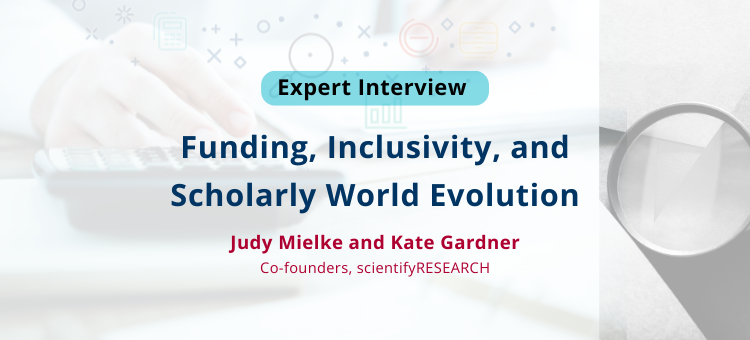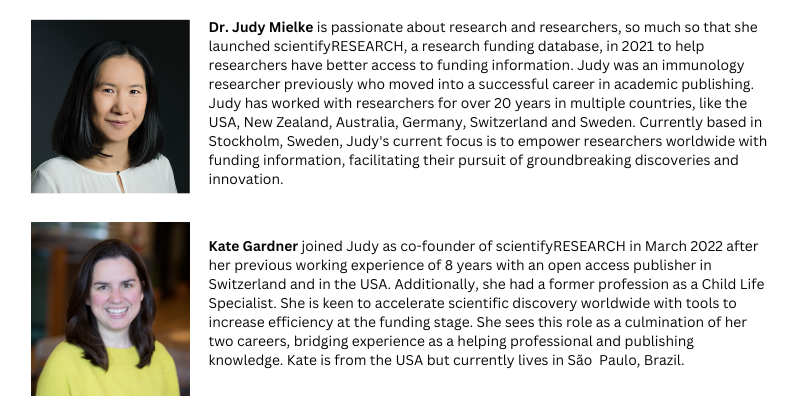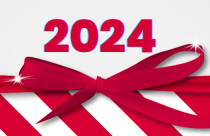Empowering Scholarly Endeavors: Insights on grants, funding, and diversity in academia

Funding plays an indispensable role in a researcher’s career. In our unwavering commitment to improve researchers’ understanding on grants and funding and other dynamics of the research landscape, we had the privilege of engaging in an insightful conversation with Judy Mielke and Kate Gardner, co-founders of scientifyRESEARCH, a research funding database. Donning roles from editors to publishers, and finally co-founding scientifyRESEARCH, both of them offer invaluable insights to this discussion.
Throughout our dialogue, Judy and Kate’s dedication to empowering researchers and facilitating knowledge creation shines through. As we delve into this enlightening conversation, their voices emerge as crucial pillars in the quest for a more inclusive and empowering scholarly world.
 Interview With Judy Mielke and Kate Gardner
Interview With Judy Mielke and Kate Gardner
A. Motivation and Passion
Q1. With more than 25 years of collective experience in the scholarly publishing industry, donning several roles from being an editor to a publisher, and then co-founding scientifyRESEARCH, what motivates and inspires Judy and Kate in this process?
Judy finds her inspiration in the spark in a researcher’s eye, observing the genuine enthusiasm that researchers have for their work. Kate’s motivation stems from the gratitude expressed by researchers, who discover new funders through their database, or from funders pleased to see increased applicants, thanks to scientifyRESEARCH’s services. Both of them love to see the success stories of researchers who are making meaningful progress and discovery.
Driven by their belief in human potential, scientifyRESEARCH’s mission is to empower researchers by providing the tools they need to succeed, starting with a well-structured research funding database, which they are proud of. Because research funding is the first step in facilitating knowledge creation, their motivation stems from the perceived responsibility to ensure that the best research is funded. Furthermore, they are inspired by their university clients who benefit from their premium database, and the funders who thank them for making their funding visible globally.
Q2. Which are some specific moments or realizations that drove the passion for working in the scholarly communication field?
The passion researchers convey as they discuss their work inspires Judy and Kate. They see this passion from researchers who reach out to them every day for funding consultations. Witnessing their dedication to discovery and innovation fuels their commitment to the scholarly communication field. On recognizing the challenges researchers face, including administrative burdens, they believe it’s their mission to alleviate those pressures. They offer a well-structured funding information that makes it easy for researchers to find the best funding options for their research. Additionally, through collaboration with esteemed academic trainers, they offer recommendations to universities seeking courses to enhance their researchers’ skills. Their ultimate goal is to make research process more joyful, by supporting researchers in pursuing their passion, and making meaningful contributions to their fields.
B. Views on Scholarly World Evolution
Q3. Understanding the views on AI integration in grant proposals and funding, and predictions for the next 5 years in the evolving scholarly world.
Both Judy and Kate envision a future where AI is seamlessly integrated into research, advancing knowledge and efficiency. They are committed to revolutionizing the research landscape by harnessing AI to streamline tasks like grant writing, allowing researchers to focus on their core work. Through partnerships with thought leaders in grant writing and AI, they offer webinars to keep researchers updated on the latest tools. Looking ahead, they are optimistic about AI’s potential to not only save time but also enhance communication of innovative ideas. Their goal is to empower researchers to dedicate more time to solving the complex challenges.
C. Advice and Support for Researchers
Q4. Advice for early-career researchers for enhancing their chances of securing research funding.
Judy and Kate can write a whole book on this! Here are some key points they shared:
- Understand your audience. Know what the funder and reviewers are looking for and craft your message accordingly.
- Know your strengths and communicate them effectively. In Judy’s experience as a former journal editor, she feels that sometimes people try to camouflage their own lack of understanding with imprecise language. Reviewers see through that.
- Time management. Writing proposals takes time, don’t wait till the last minute to start. Also, there may be logistics and other people involved, such as signatures from your mentor or the Department Chair, so plan accordingly.
Finally, funders would like to hear from you, don’t be afraid to write to funders to determine whether your research is aligned with their grant program.
Q5. Belief on the contribution of open access in research funding to the accessibility and dissemination of research. Understanding what challenges they foresee in promoting open access in the current academic landscape.
Judy and Kate expressed the prevalence of a miscommunication about the funding model behind open access. They said that many researchers today still think of it as an “author-pay” model, which is incorrect in the industry, because ultimately the funds are derived from research funders. Instead, they encourage authors to feel empowered in becoming the decision makers of their publishing budget – because finally, authors can influence the journal’s services through their publication choices.
Another element is the perception that open access is a “pay-to-publish” model and this is detrimental to the quality of scientific output. They attribute this phenomenon to the academic incentives in place whereby getting published is seen as a goal rather than a process of iterative improvement. If the incentives changed and authors feel more accountable for what they publish, much of the perverse behaviors associated with open access publishing may be alleviated.
Q6. What influenced them in releasing resources on curated funding sources for women researchers during International Women’s Day last year. Also understanding the plan to take any similar action this year.
The leaky pipeline of women’s talent in all industries is apparent and according to them, academia is no exception to this. Anything they can do to support other women in their career is their and therefore they curated a list of funding opportunities that are specifically dedicated to women in research.
Every year on International Women’s Day, scientifyRESEARCH hosts a webinar focused on empowering women researchers. This year, in collaboration with TCC Africa and Scidev.net, they assembled a panel of remarkable women in research to discuss strategies for empowering women researchers through funding initiatives. By fostering dialogue, collaboration, and advocacy, they aim to address the challenges women face in academia and facilitate their advancement into leadership roles.
Their curated funding lists form a part of their effort to make funding information more accessible to all researchers. The beauty of having information structured is that these lists are continuously updated, unlike other lists found online.
Additionally, they believe in diversity and equal opportunity for all, and in that direction, they have funding lists for researchers in low and middle-income countries (LMIC) and funding opportunities that promote diversity research.
Q7. Thoughts on dismantling systemic barriers to ensure equitable access to research funding
There are many steps in the funding process, from funding information discovery, grant writing, to convincing reviewers, and much more. One thing for sure is that at all stages there are different systemic barriers to equitable distribution of research funding.
As a research funding database, they can speak with authority on the discovery of funding information. In their conversation with researchers, they noticed a pattern of haphazard discovery of funding information. People rely on the chance to find funding information, waiting for peers or research managers to tell them about opportunities. Most researchers are not familiar with research funding databases, and they suspect several reasons for this. One is that most funding databases are only accessible via the University’s system, which means many researchers don’t even know that they have access. And many of those who know about their university’s research funding database are frustrated by the irrelevant information that they receive from the database when searching for ideal funding.
When they built their premium research funding database, they built two important aspects to help with funding information discoverability: First, an open access version that helps with discoverability of our database as a research funding tool, and second, a well-structured database that takes into account all the eligibility criteria of the funder so that the research funds can be best matched to the target researchers.
D. Collaboration
Q8. How will the collaboration of scientifyRESEARCH with Enago provide publication support services in boosting academic support globally?
Most researchers are great at what they do – research. But not all are great communicators of their own research. This is a common challenge for all, not just researchers. For researchers, communication is key to all aspects of their career progression, be it success with grant applications or journal publications. As a company, they recognize the power of a team – so they are excited to be partnering with Enago to offer publication support services – so that their audience can also benefit from Enago’s extensive experience in publication support and present their research in the most effective way possible.
E. Closing Thoughts
Q9. Gathering final thoughts that should be known by researchers, funders, and grant offices
At scientifyRESEARCH, they both believe that research is about advancing human knowledge and challenging the status quo. They suggest all the stakeholders on their research funding platform, the researchers, the research offices, and the research funders, to apply this philosophy more often.
They ask researchers to challenge your assumptions of knowing all the research funders out there. Can using a research funding database help you discover funders that would fund your research and that you did not know about before?
For research offices, they would like to ask them to do a root-cause analysis of the bottlenecks to more research funding success for their researchers. Many research offices tell them that although they have subscribed to expensive funding databases, researchers do not using them. Is it because they don’t know about it? Or is it because the quality of information provided by these is poor? Or both? Understanding the root cause of a problem is the only way to solve it.
Additionally, they ask the research funders to think more about how they are reaching out to researchers. Unless you are a national funder that everyone knows about, it may not be adequate to assume that having a website is sufficient to disseminate your funding information to the right researchers. Also, organic social media is only useful if the researchers already know about you. After all, your mandate is to advance the mission of your organization, be it to cure cancer or promote sustainability of the planet, and this can only be possible if the right researchers apply to your research funding opportunity.









